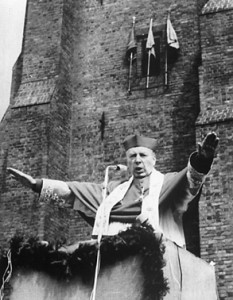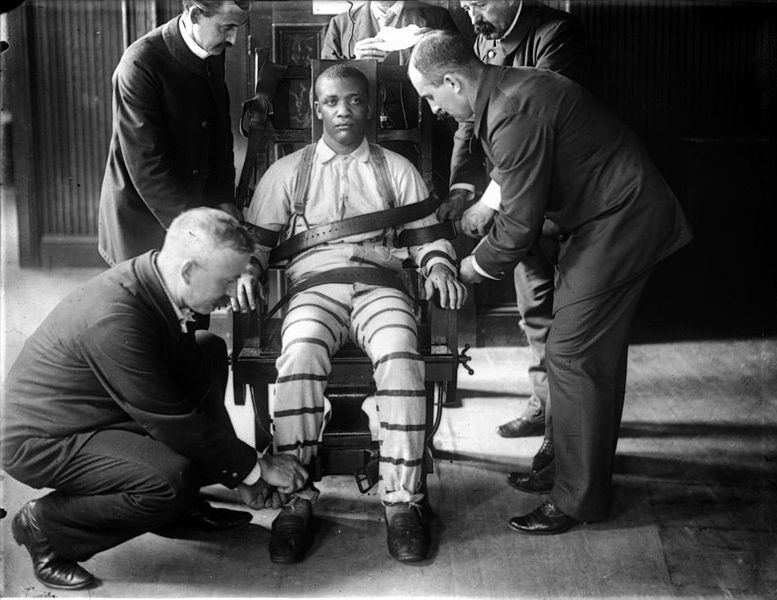 All You Who Labor: Work and the Sanctification of Daily Life
All You Who Labor: Work and the Sanctification of Daily Life
Cardinal Stefan Wyszynski
Sophia Institute Press, 1994
Book Review
Homo nascitur ad laboreum, et avis ad volatum. “Man was born to work, like the bird was born to fly” (Job 5:7).
Though written in the Latin Bible, these words could describe our work-obsessed society—with its hourly updates on the stock market, its debates over “workfare” and the “working poor”—where lots of people are working for the weekend and many others seem married to their work.
Whether we work for wages or profit or are looking for work, Americans today look to work to make ends meet or bring home the bacon. Work is the ticket to the things we need or want to make life comfortable.
But few of us see our work as an essential part of who we are. Whether we are workaholics or work shirkers, we see work as necessary for survival, but divorced from and usually an obstacle to our “life”—our hobbies, our prayer, our families, our deepest aspirations and desires.
When it comes to the working life, the Catholic Church has not always been all that helpful or understanding, despite its humble beginnings in the Son of a carpenter, who spoke so eloquently in parables of doctors, shepherds, householders, sowers, merchants and day laborers.
The Church has emerged as a champion and defender of workers’ rights and dignity—recall Pope Pius XI’s frightful image: “Dead matter comes forth from the factory ennobled, while men there are corrupted and degraded.”
And along the way, various Catholic offshoots—the worker priests in France, Opus Dei in Spain, Madonna House and the Catholic Worker in North America—have tried to spell out a spiritual language of work.
But still today, the vast majority of Church preaching and pronouncements is based on the assumption that the work men and women do—whether in the home, factory, office or field—is a sphere separate and distinct from their spiritual needs and concerns.
St. Joseph, Worker
In the 1950s, the Church established May 1 as the feast of St. Joseph the Worker in an effort to celebrate human work. But when was the last time you heard a Sunday sermon devoted to what Pope John Paul II has called “the Gospel of Work”?
Even the Second Vatican Council’s teachings on “the universal call to holiness” have not led to a broad movement of Catholics trying to make their work holy and to become holy through their work.
Rather, we see only more lay people serving in clerical functions—as deacons, eucharistic ministers and the like—further reinforcing the idea that holiness is possible for vowed religious and priests, and that sanctity is to be found, not in the world of work and family, but only behind church walls.
All of which makes so timely the reissue of Cardinal Stefan Wyszynski’s 1948 book, All You Who Labor: Work and the Sanctification of Daily Life.
A fiery anti-communist, Cardinal Wyszynski, who died in 1981, was the mentor of Solidarity leader Lech Walesa (now Poland’s president, who offers an introduction to this reissue) and Karol Wojtyla, now Pope John Paul II.
And it is hard not to hear the echoes of the situation in the world today when Cardinal Wyszynski writes of the “deification of work,” of workers so overworked they do not know how to relax; of the contrast between the city at dawn, so full of energy and possibility, and at dusk “when the worn out, drooping figures return, weighed down by the whole day.”
Underlying the crisis of modern work as Cardinal Wyszynski sees it, is that work in our day has been reduced to a function of animal need.
 “But work has more than merely consumer aims,” the cardinal insists. “More than the stomach and the mouth compel man to work.”
“But work has more than merely consumer aims,” the cardinal insists. “More than the stomach and the mouth compel man to work.”
Cardinal Wyszynski believes that, as Job put it, human beings are made to work, not only out of need, but as part of God’s plan.
Meditating on Psalm 104, Cardinal Wyszynski describes God’s plan in glorious prose: “It is God by the power of his will who carves out the valleys and mountain crevices, who spreads out the fertile fields like carpets, snatches the waters of the sea up to the heavens and rains them as dew onto the harvests of the earth. It is God’s thought that forms the face of the earth in a wonderful way, ornamenting it with the flashes of his beauty.”
The cardinal grounds his spirituality of work in God’s finest work—the creation of people in his own image. We are, by our very nature, meant to work in imitation of our Creator, as “co-workers” in God’s work of redeeming the world.
The key to the cardinal’s spirituality of work is the motives, the intentions that lie behind our work. Perhaps right now we work for the mortgage or the kids’ tuition. But Cardinal Wyszynski would have us change our motives, to do everything, even the most menial of our tasks, “out of love for God.”
“The smallest act can be sanctified by the intention that inspires it; it can bring merit with it and redemption, if its motive is the love of God,” Cardinal Wyszynski instructs. “The value of human acts comes from the intention behind them. The lowest work can, through love, raise up to the heights of holiness, while the loftiest work, when it is performed without love, lowers and damns one.”
The holiness he speaks of is not some therapeutic sort of baptized self-esteem where individual progress is the goal. No. Cardinal Wyszynski wants to lead “man out of the narrow backyard of his own purely personal affairs, onto the broad highways of love.”
If we are truly sanctifying our work, we will be filled with a spirit “of sacrifice, or disinterestedness, of service to those who cannot work, of service to the poor, to orphans, and to those who are unfit for effort or toil, especially the sick.”
The Catholic worker should strive to be efficient, productive and thrifty, not to satisfy any abstract “work ethic,” but in order to have more time and money to share with the poor.
In lines that could appear in any of the encyclical letters of his protégé, Pope John Paul II, Cardinal Wyszynski writes: “To forget oneself for love of one’s neighbor, to limit luxury, so shocking side-by-side with poverty: this is the task. Our life should be simplified, set free from the superfluity of things and artificial needs that are swamping us.”
Nor should one mistake Cardinal Wyszynski for preaching a middle-class gospel that tolerates social injustice and teaches the poor to stay in their place and suffer quietly in anticipation of some heavenly reward when they die.
Wrecks of God’s Work
With the sensitivity of one who has ministered to the downtrodden and exploited, he decries working conditions that “wreck God’s saving plan in relation to work” by exhausting and degrading people: “In fact, the contemporary organization of work very often distracts man completely from God, owing to its one-sided exploitation of [his] efforts and time.” Nearly half a century after it was written, All You Who Labor speaks in the tones of the prophet to an age in which man is often diminished, degraded and even annihilated by the works of his own hands.
Cardinal Wyszynski’s call for the “sanctification of daily life” stands in what can be seen as a tradition of Catholic protest against the modern dwarfing of man by machines and ideology.
It takes place alongside “the little way” of St. Therese of Lisieux. and Blessed Elizabeth of the Trinity’s “praise of glory.” With these saints, Cardinal Wyszynski hopes to sound a return to a divine estimation of man. In their protest against the age, all three clung to the truth contained in our baptism—the divine potential of our smallest acts, when transformed by love and grace, to raise the soul up to conversation with God, to crack open hearts of stone and even to turn back the tanks of tyrants.
More to the point, though, Cardinal Wyszynski reminds us that nobody—whether we be wage earners or profiteers—is made only for consumption and production. We are, in reality, works of God in progress, and our own work—our very existence—is to become blessed. “All ye works of the Lord, bless the Lord” (Dan. 3:57).
Originally published in Our Sunday Visitor (April 30, 1994)
© David Scott, 2009. All rights reserved.


